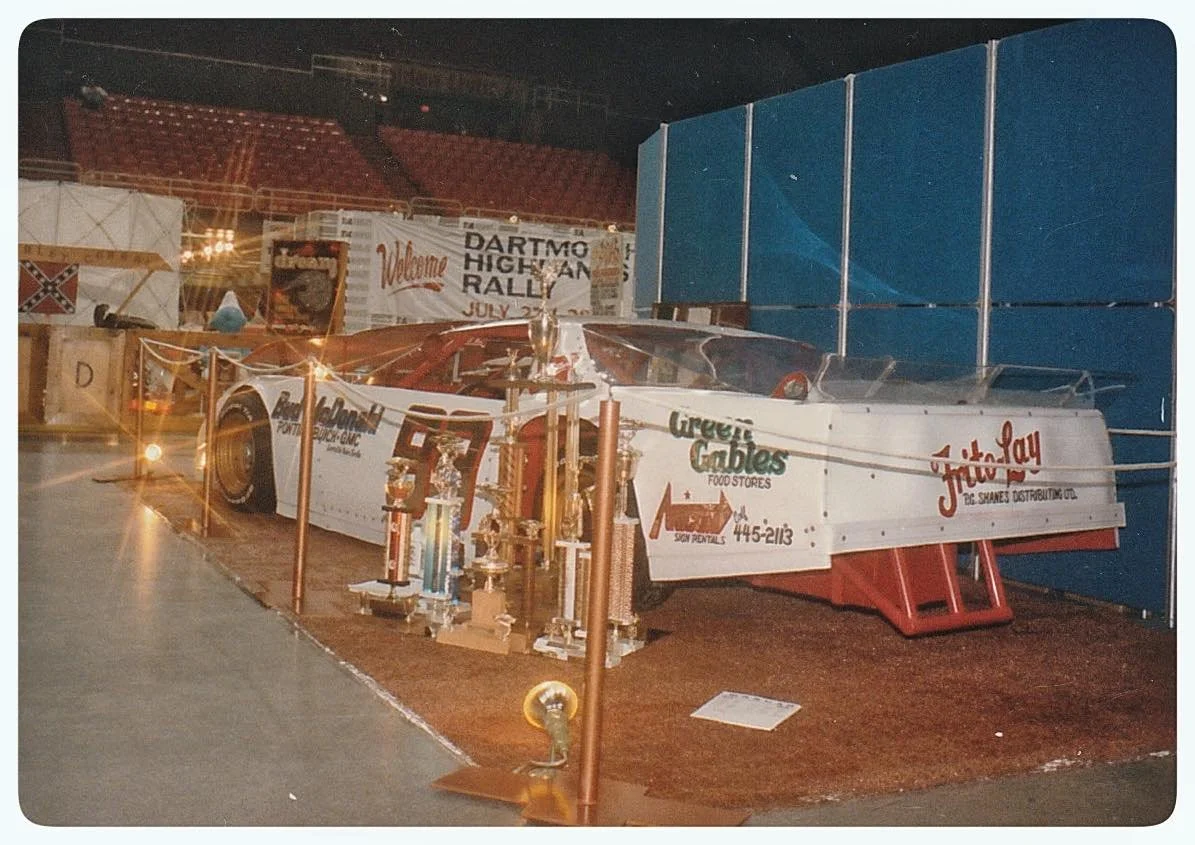Greg Sewart – A Maritime Racing Legend
#99 Greg Sewart - All Photos in this article Courtesy of: Ken Bottomley
August 1st, 2024
Introduction
If you’re talking about Maritime racing legends, Greg Sewart’s name is right up there. Sewart’s career, spanning decades, is marked by numerous championships, marquee victories, distant travels, and a profound impact on the racing community. From his early days, to becoming a dominant force in the Maritime stock car racing scene, Sewart's journey showcases his remarkable skill, dedication, and passion for the sport.
Early Career
Sewart began his racing journey in 1976 at Atlantic Speedway in Lucasville, Nova Scotia, a now-lost 1/2 mile paved track. His first win came in his first-ever stock car race in a Sportsman, clinching the division's rookie of the year title and the championship. Sewart repeated as the Sportsman champ in 1977 and finished 3rd in the 1977 Bud's Speedway Maritime Late Model Championships in Sydney, Nova Scotia. In 1980 he switched gears, winning the Modified division championship at Atlantic Speedway.
Through the early 1980s, Sewart raced around the US Northeast and Ontario. Just a few years after the now defunct 1/4 Onslow Speedway in Truro was paved, he captured the 1982 Late Model Championship there.
Racing with a Purpose
During Sewart’s first year of racing, in 1976, tragedy struck. Mid-way through a feature race on July 4th at Atlantic Speedway, the race was stopped. With Greg and the other drivers directed to the front-stretch unaware of the situation, as there was no obvious on-track incident, he was informed by one of his crew members that someone in the grandstands had, had a heart attack, and they needed to make room for the ambulance.
“I was sitting in the car and wondering if it could be. My crew guy came back 5 minutes later and said you better get out: it is your dad. So I said from that day on that I was going to be the best I could be at racing, and that I would dedicate my racing to him. He was 52 years old.” - Greg Sewart
Notable Achievements
Sewart’s career is highlighted by multiple championships and significant victories. In the newly-formed MASCAR touring series he won the points championship (as well as the Onslow points championship) in 1983, and the International 200 at River Glade Speedway, New Brunswick. This race, now contested at Petty International Raceway, is the oldest marquee stock car race in The Maritimes, once drawing 10,000 in attendance. Sewart also doubled up with the 1984 River Glade International victory, was named the 1985 MASCAR Driver of the Year (a fan-voted award), won the 1986 Riverside International Speedway 250 (currently known as the IWK 250), the 1987 MASCAR Championship, and the 1989 Halifax 300 at Scotia Speedworld.
In the 1990s, his success continued, if not improved, as he secured the 1992 MASCAR Driver of the Year championship for his second time, and the '92, '93, and '95 MASCAR points titles, making for a legendary, and most of any driver, 5 MASCAR points titles. He won the 1993 Riverside 250 and had a second-place finish in the extremely competitive 1994 Oxford 250, an incredible feat. Showing his diversity, he also won three of the five Moosehead Grand Prix street course races for MASCAR, held on a 1.15-mile course near Citadel Hill, Halifax.
Challenges and Triumphs
The road wasn’t always smooth. Mechanical failures and intense competition were constant hurdles. Yet, Sewart’s resilience was legendary. Whether it was making crucial repairs during a race or avoiding near-disasters at tracks like Spud Speedway, Maine, Sewart’s career was defined by his ability to overcome adversity and come out on top.
A Historic 1987
1987 was quite a year for Sewart. He won 9 of 17 MASCAR races en route to the points championship. He won the season opener at Riverglade, lapping all but second place. It was the same scenario for race #2 at Riverside. Sewart won four of the first six races in ’87 and then the Coca-Cola 100 at Riverglade by lapping the entire field without any cautions. An incredible season.
A Memorable 1989
1989 was another standout year for Sewart. He won the season opener at Scotia and then clinched the Halifax 300 that summer. This victory was particularly significant as it came with a trip to the ASA National Series Nashville Fairgrounds All American 400 for the car with the most points at Scotia that season. The prize included a trailer and a car to race. Despite challenges with the borrowed car from Ed Howe’s shop, including a last-minute build and a borrowed V6 engine from Mike Eddy, Sewart cherished the experience and the lessons learned, even if the results didn’t match his expectations.
Legacy and Impact
Greg Sewart’s legacy isn’t just in his trophies. His induction into the Maritime Motorsports Hall of Fame in 2010 and the Canadian Motorsports Hall of Fame in 2012 speaks volumes about his influence on the sport. Sewart’s influence continues to inspire new generations of racers, and his storied career remains a benchmark for excellence in stock car racing. The restoration of his 1967 Chevelle, the car that launched his career, highlights his lasting legacy and the community's effort to preserve racing history.
Greg Sewart’s career in Maritime racing is a remarkable story of talent, perseverance, and achievement. His numerous championships, significant victories, and enduring legacy make him a true legend in the world of stock car racing. As we reflect on his contributions to the sport, his name will always be celebrated as one of the greats in Maritime motorsport history.

